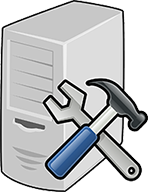Tax Deductions for Computer Specialists

Anyone who works as a PC specialist for a company can expect to receive a Form W-2, Wage and Tax Statement which will list your earnings and withholdings. If you freelance, or receive earnings outside your regular employment, you may be considered self-employed, and required to file a Schedule C, Profit or Loss from Business. Self-employed individuals may receive a Form 1099-MISC, Miscellaneous Income, instead of a W-2. Net earnings over $400 are subject to self-employment taxation, and you may need to make estimated tax payments in order to cover the amount you report on the Schedule C.
You can reduce your tax liability by claiming deductions for job-related expenses you incurred that were not reimbursed by your employer. Employees claim deductions on a Schedule A, Itemized Deductions, while self-employed computer technicians use a Schedule C.
You should keep all receipts and documentation to prove your expenses. Some examples of deductible expenses are:
- Fees for subscriptions to trade publications and magazines
- Union dues
- Liability insurance premiums
- Special equipment replaceable within a year
- Safety equipment such as goggles
- Bad business debts
- Vehicle expenses to travel between job sites
- Employee salaries, bonuses, deal and commissions
- Legal and professional fees
- Rental fees for business equipment
- Repair, upkeep and maintenance of tools and equipment
- Supplies and incidentals
- Advertising costs
- Excise taxes, as well as personal property tax on the enterprise
- Travel expenses if away for an extended period of time outside a typical days work.



